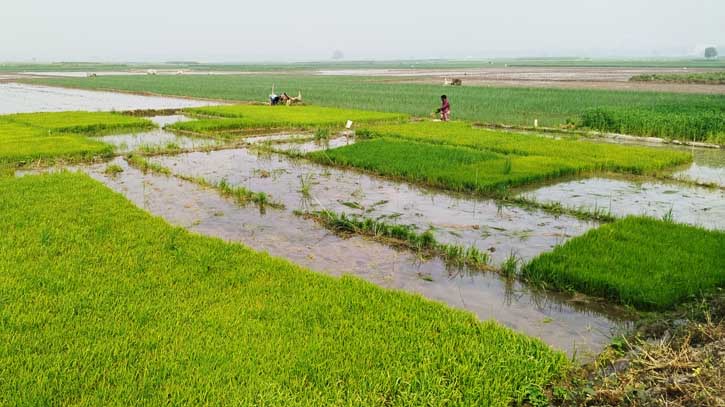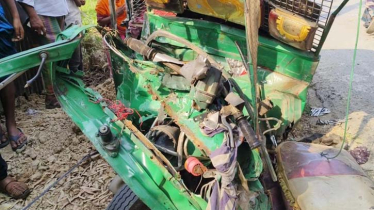
Photo: Collected
The golden fields of Meherpur are abuzz with activity as Boro cultivation unfolds in full swing, but farmers are not happy. Braving the crisp winter air and dense morning fog, farmers toil diligently, their hands weaving a future of promise in the fertile soil. Yet, amidst this determined pursuit of a bountiful harvest, a shadow looms-soaring costs of fertilisers and pesticides threaten to dampen their hopes.
This season, the Department of Agricultural Extension (DAE) has set an ambitious target to cultivate Boro paddy on 19,427 hectares of land across the district's three upazilas.
With seedbeds flourishing across 978 hectares and nearly 20% of the transplantation process already completed, the fields whisper tales of resilience. Despite the biting cold, farmers started their labour of love on January 14, pushing forward with unwavering dedication. Transplantation is expected to continue until March 10, as they press on, their sweat mingling with the dewdrops of early dawn.
This year's landscape is painted with hybrid and high-yielding varieties, including BRRI Dhan-28, BRRI Dhan-50, BRRI Dhan-58, BRRI Dhan-63, BRRI Dhan-74, and BRRI Dhan-89.
These grains of promise are poised to cover 19,327 hectares, nurturing aspirations of a prosperous yield. However, the road to abundance is not without its hurdles. The ever-rising costs of seeds, fertilisers, and labour weigh heavily on the shoulders of these cultivators of the land.
Yet, hope flickers in their eyes. They believe that timely transplantation, coupled with devoted care, will yield golden stalks swaying in the breeze.
"The weather has smiled upon us this year, and the seeds we received are of excellent quality," said Chad Ali, a farmer from Bawt village in Gangni upazila. "If all goes well, our harvest will surpass that of last year."
Not all voices sing a song of optimism.
"Fertiliser prices have soared beyond our reach," lamented Amir Hamza of Shukurkandi village. "Though they are available at a higher cost, finding them at government-fixed rates remains an unfulfilled dream."
Nurul Islam from Milmari village shared a similar plight. "Prices have skyrocketed-fertiliser that should cost Tk 1,000 is now Tk 1,400. The authorities must intervene to protect us from exploitation."
In response, Awkat Hossain, owner of M/s Shawkat Traders, a fertiliser and seed dealer in Gangni upazila, dismissed claims of a shortage.
"We have ample supplies of DAP, urea, and MOP fertilisers, and the allocation for February has already been made," he assured.
He, however, acknowledged a surge in demand, attributing it to the sharp rise in tobacco cultivation, which has nearly doubled this year, consuming a significant portion of the district's DAP fertiliser. Despite these hurdles, Meherpur stands as a beacon of agricultural promise.
"Our district is a granary of crops," said Bikash Krishna Haldar, deputy director of Meherpur DAE, his voice brimming with pride. "Boro paddy shares the land with wheat, maize, mustard, onion, garlic, and a wealth of vegetables, causing a slightly later start to the Boro season."
Yet, he reassured that the flow of agricultural inputs remains unhindered, ensuring that farmers have all they need to reap a successful harvest.
"With favourable weather, steady support, and the farmers' undying spirit, we anticipate a harvest that will bring prosperity to the land," he affirmed.
Messenger/Tareq








